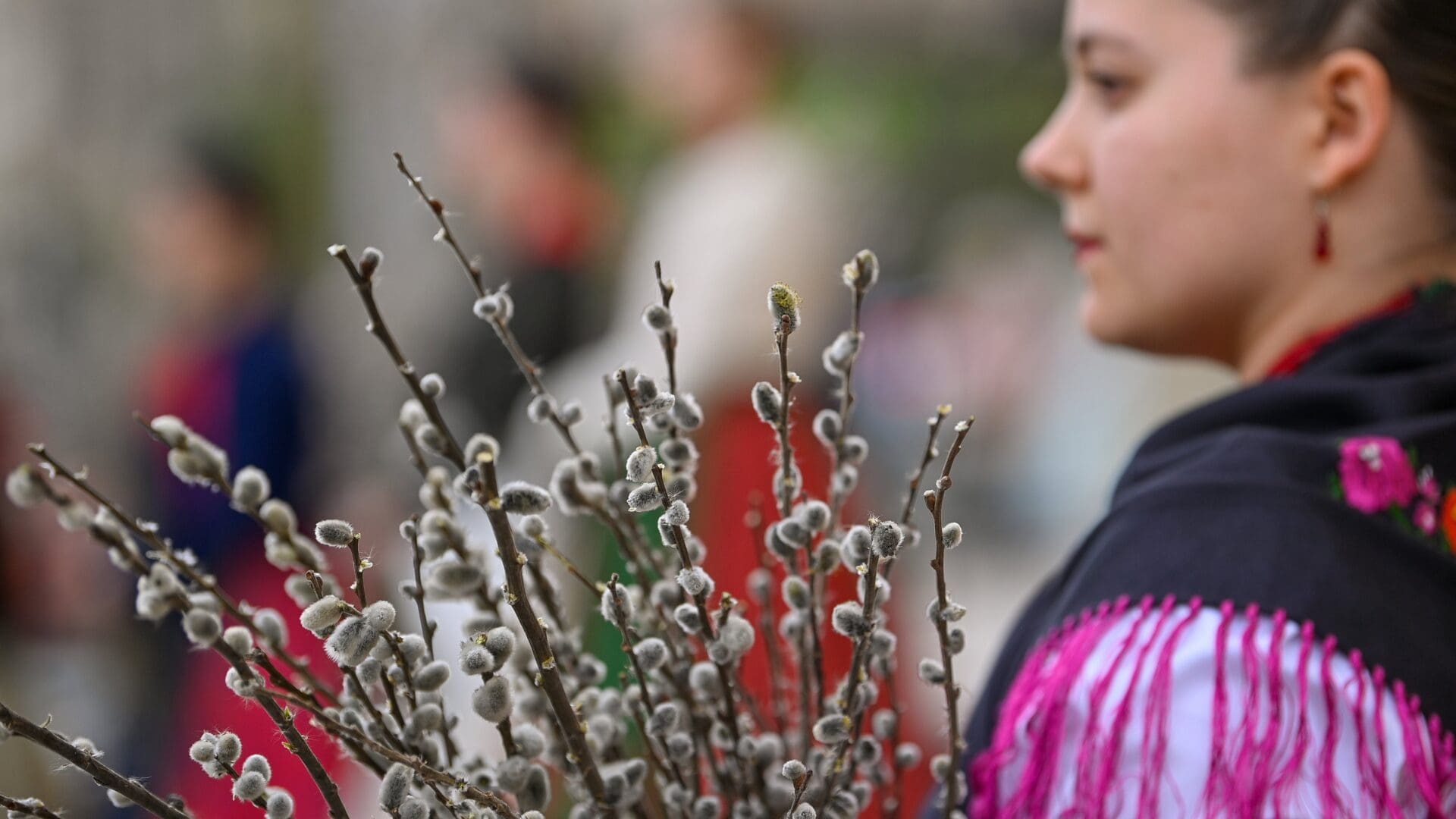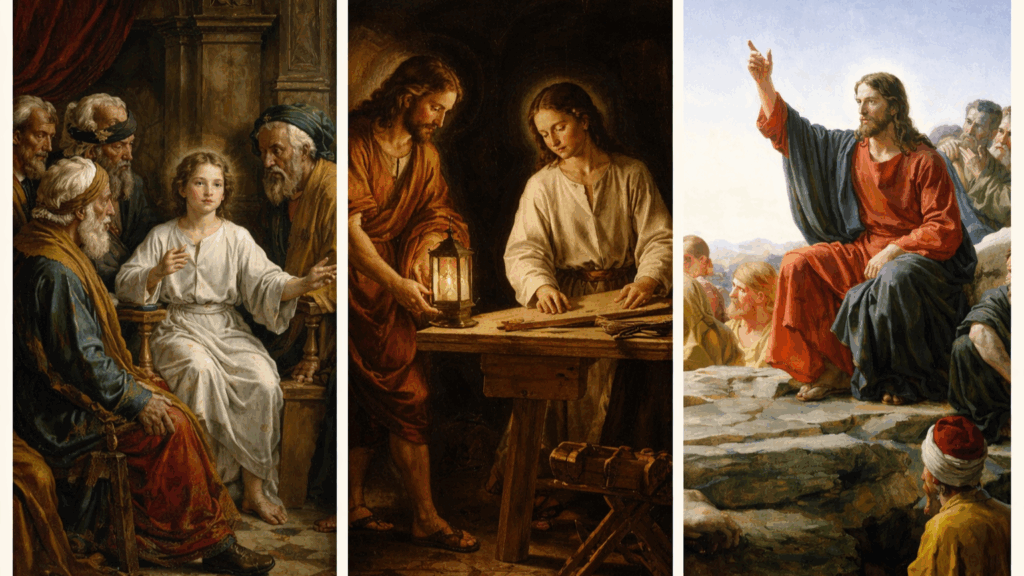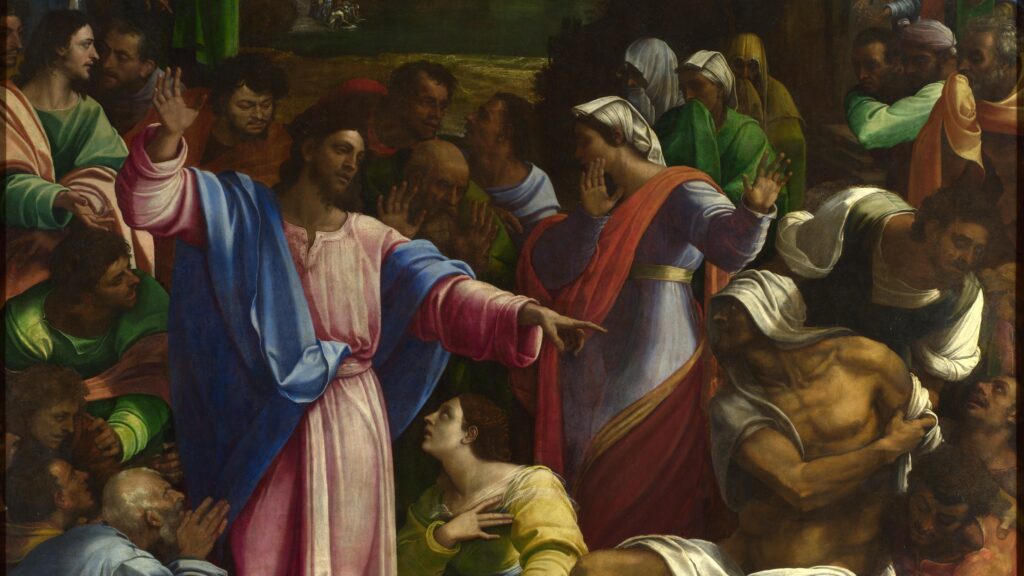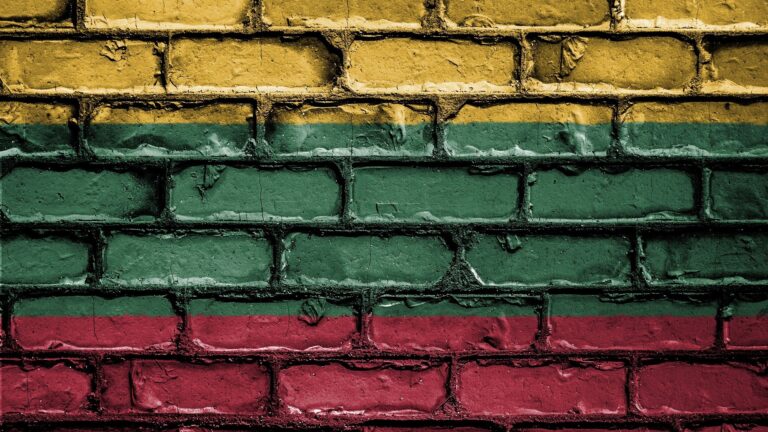Holy Week, the seven days leading up to Easter, started with Palm Sunday yesterday in the Western Christian world. To mark this important period of spiritual preparation for the celebration of Christ’s redemptory work for those who are believers, and of preparation for the joyful celebration of the secular holiday for those who are not, we are sharing with our readers translated excerpts from Sándor Bálint’s book Holidays’ Calendar, describing the most important Hungarian folk customs related to the Holy Week.
Spiritual and Physical Cleansing
Holy Week, or as Elek Somogyi recorded its folk name, Dire Week (sanyarúhét), is also called videshét (vizeshét, Watery Week) by the Calvinists of Bajánsege in the Őrség (a region in north-western Hungary bordering with Austria.) The spring rebirth of nature inspires humans to engage in an analogous renewal and purification. These ancient spring lustration customs aim to secure people’s health and wellbeing, to keep illnesses away, and to protect the household and the farm animals. The magical activities connected to these customs were performed mostly on Holy Week by Hungarian peasants. Holy Week was at the same time a period of preparation for Easter and an immersion into faith, as well as of bodily but primarily spiritual cleansing until the beginning of the past century. is. The fragments of this tradition are still observable in certain magical-like activities of rural communities.
Even in the first part of the 20th century, the palóc people (the Paloc) would clean the entire household on Holy Week. They would clean the stables, mend the barn and other outbuildings, they would sweep, lute, whitewash, so that their abode would almost completely ‘rejuvenate.’ Men would repair their tools, and sometimes would even polish them. All utensils and furniture had to be sparkling clean. When the Paloc were done with their houses, they would remember their dead and would put their tombs in order.
Similar preparations took and sometimes still take place in other parts of the country. The ethnic German people of Magyarpolány would clean and decorate the graves of their forebears, just as they did on All Souls’ Day. In the Rábaköz (a sub-region of the Kisalföld in North-Western Hungary between the rivers Rába and Répce) village of Szil not only the cemetery, but even its ditches are cleaned for Easter. All graves are set in order, including of those who have no descendants left to take care of their resting places. Finally, a bunch of catkins is placed on each graveyard. The cleansing reaches its peak especially on Good Friday and Good Saturday.(…)
Asking for Forgiveness
In some places the young apologised to the elders, that is, they asked for their forgiveness, and in many places they also kissed their parents’ hands. This asking for forgiveness was sometimes done by the parent to the child, or by the farmer to his farm hand. Former Szeged residents also visited those whom they felt had offended in some way. Before leaving, if not at any other time, parents’ hands are kissed in many places. In the Paloc village of Szubogy, the asking for the parents’ forgiveness sounds like this: ‘Forgive me, if I have offended you, God will forgive you!’ To which the answer is: ‘I’m forgiving you, you can go!’ The answer in Felnémet is similar: ‘I forgive you; may God forgive me!’ In Hollókő, those who go to confession or a Feast Day, not only apologize to their relatives, but also to every villager they meet on the way. Those going to confession in Hangony reconciled with their relatives by saying: ‘I am asking for the wounds of Jesus, forgive me, I want to confess!’(…)
Other secularized forms of confession…[included] a tradition recorded in the village of Tamási in Tona County. At the beginning of the 20th century, there were still pious old women there who knelt before the cross of the Calvary on the afternoon of Good Friday, i.e. at the hour of the Saviour’s death, confessed to Jesus himself and went to confess during the Easter holiday. Such auxiliary methods obviously originate from the times of the Turkish occupation when Catholics had to go without a priest (…)
Special Prayers
The Pope’s prayer also sprang and bloomed from the soil of the fertile soil of the Middle Ages until the most recent times, especially in the paperback literature and sacral traditions of the Szeged region until the most recent times. It preaches that man, immersed in sin, can only be saved from damnation by the edifying reflection on the passion and death on the cross of Jesus Christ, and repentance.
The source of the Hungarian performance of the Gömöry Codex is the work of the 15th century Carthusian monk Dionysius Carthusiensis, titled Aureum Speculum animae peccatricis: docens peccare vitare, osteniendo viam salutis. (The Golden Mirror of the Sinful Soul: Teaching How to Avoid Sin and Presenting the Road to Salvation.)
Although the pious prayer cites the fruits of the passion of Christ, we will not quote it here, as it is customarily recited over those dying. However, in pious female communities is it also prayed on Holy Week.
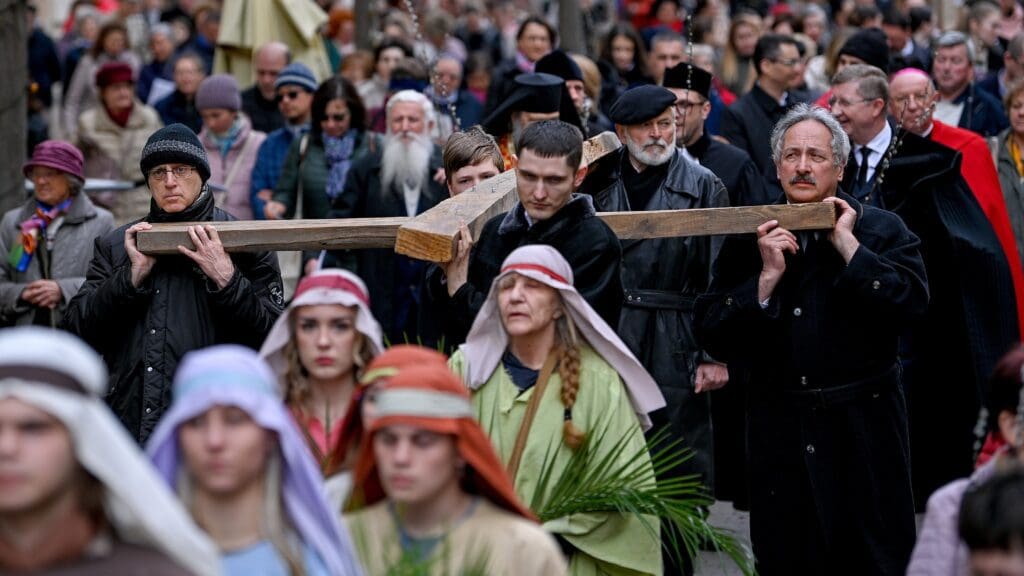
A most typically Holy Week prayer, on the other hand, known as The Golden Lord’s Prayer, is one of the most beloved meditative prayers of the religious Catholic women of Hungary. In it, Jesus tells his mother, Mary what awaits him on the days of the Holy Week.
As far as we know, the origin of the prayer is unclear, but it appears to have been already known by Hungary’s ethnic Germans as early as in the 15th century. It cannot be found in the Hungarian medieval codex literature, although it bears resemblance to the passion play of the Weszprémi Codex in which Jesus and Mary converse in Bethania. It may have been included in Hungary’s massive baroque prayer-literature, but we have not yet discovered any examples. Several Hungarian, German and Southern Slavic Catholic versions of it emerged in the last century at book fairs, and the Slovenes are also familiar with the prayer; the Czechs and the Slovaks may also be aware of it.
The Golden Lord’s Prayer is in fact the saying goodbye of Jesus to his Mother for the first time, on Palm Sunday, something that is not included in the canonical Gospels.
Below is the translation of the entire beautiful dialogue between Jesus and Mary, which places the Holy Week and Jesus’s sacrifice into the larger perspective of the victorious message of Easter: eternal life.
My dearest son, Jesus! What will you do on Palm Sunday?
My dearest mother, promptly I will tell you: I will be a great king, I will gloriously enter Jerusalem, I will warn and teach the people about the law of my Father, and I will preach about the new covenant of redemption.
My dearest son, Jesus! What will you do on that Holy Monday?
My dearest mother, promptly I will tell you: I will be weak and ill, no one will respect me any more, no one will help me walk to the church.
My dearest son, Jesus! What will you do on that Holy Tuesday?
My dearest mother, promptly I will tell you: I will be a poor itinerant, I will wander from town to town, and I will have no place to lay my tired head to rest.
My dearest son, Jesus! What will you do on that Holy Wednesday?
My dearest mother, promptly I will tell you: I will walk up to the holy Mount of Olives and will be sleepless because of the great fears I will have. I will be escorted from one judge to the other, from Annas to Caiaphas, from Caiaphas to Herod, and from Herod to Pilate.
My dearest son, Jesus! What will you do on that Great and Holy Green Thursday?
My dearest mother, promptly I will tell you: that false Judah will sell me for thirty pieces of silver.
My dearest son, Jesus! What will you do on Good Friday?
My dearest mother, promptly I will tell you: I will be crucified to a tall cross, with my hands and feet penetrated by three horrid iron nails. A soldier will approach me, will pierce my side with a lance, and blood and water will from flow it. And My Father will send two caregivers, by the name of Saint John and Joseph of Arimathea, who will take me off the cross. You, my dear mother, will look at me with your holy eyes, will wash me with your holy tears, and will wipe my bloody body with your holy hair. And I will be lying dead until the evening of Saturday, like a sleeping baby in its cradle.
My dearest son, Jesus! What will you do on Good Saturday?
My dearest mother, promptly I will tell you: I will be lying in a deep grave until the holy day of Easter, and will in the meantime descend to hell, to free the souls waiting for me there. When resurrected, I will take them with me to my Father’s Kingdom, as a glorious sign of the achieved work. And the happy song of salvation will be forever sung in heaven.
Upon hearing that, thus spoke the Blessed Virgin Mary:
Those mortals who pray this Golden Lord’s Prayer of holy prophecies once or several times, and by doing so remember my Seven Great Sorrows, and the passion and death of my dearest Son, will not be forgotten in the heavens. All their prayers will be listened to in their lives, and after their death, their souls will shine before God in the beam of light of eternal salvation, which grows greater and greater endlessly, forever and ever. Amen.

